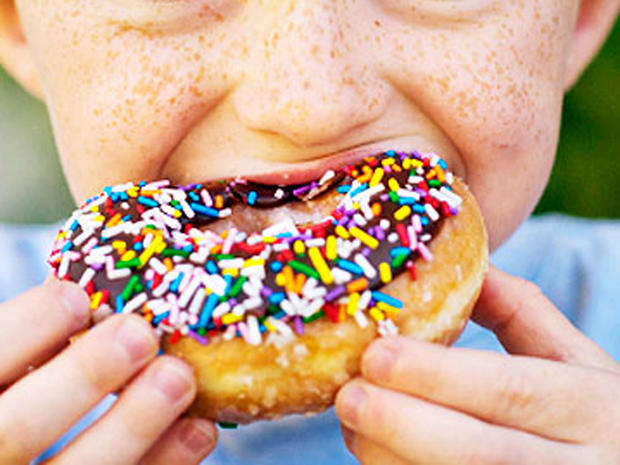Should 7-year-olds be put on strict diets? Vogue article sparks debate
(CBS News) Dara-Lynn Weiss' daughter, Bea, had become a statistic. At 4-foot, 4 inches and 93 pounds, the 7-year-old had become obese. So, the Vogue columnist did what she knew best: She put Bea on a strict diet.
"One day Bea came home from school in tears, confessing that a boy at school had called her fat. The incident crushed me, but it was a wake-up call. Being overweight is not a private struggle. Everyone can see it," Weiss wrote in the April 2012 issue of Vogue.
VIDEO: 12-year-old teaches town to lose weight
Bullied boy loses 85 lbs., inspires others to lose
Weiss wrote she decided to enroll her daughter into a "Red Light, Green Light" diet program. The mother detailed her struggle to keep Bea fit and how she turned to such tactics as making her go without dinner after she celebrated French heritage day at school, banning her from participating in "pizza Fridays" and publicly admonishing her cravings in front of others. In the end Bea lost 16 pounds in one year, but it has left many wondering whether the harsh and berating treatment worth the weight loss.
While Bea's weight loss was impressive, some experts say that Weiss went about it all in the wrong way. Dr. Joanna Dolgoff, who runs the Red Light, Green Light, Eat Right program that Bea enrolled in, confirmed to HealthPop that Bea's weight made her considered obese, and said she respected and understood why Weiss was so strict because of the difficulty of the situation.
But, Dolgoff insisted that Weiss' methods were not the intention of her program. The traffic light-based diet system revolves around teaching kids healthy eating habits, so they can be in charge of their diet plans.
"We want to empower these kids," Dolgoff said. "Studies show that if you treat overweight kids in a sensitive manner, you do decrease emotional problems."
Dolgoff said that the Weiss stopped going to the counseling sessions halfway through the program and Bea and her mother didn't get the emotional support they needed. The Red Light program ultimately allows the child to make the decisions, and even if the kid slips up and eats something that is unhealthy, parents are advised to let them do it.
"Their emotional health is extremely important, and that's what we talk a lot about in the visit," Dolgoff said. "We don't want them thinking they've been bad. We explain it's hard to be healthy in our society when they put supersized everything in front of you."
Childhood obesity is a society problem in the U.S. According to the Center of Disease Control,
between 1980 and 2008 the percentage of children aged 6 to 11 who were
obese has risen 14 percent, and for those 12 to 19 years it has gone up
13 percent. More than one third of children and adolescents are overweight or obese.
Obese youth between the ages of 5 to 17 are 70 percent more likely to have at least one risk factor for heart disease, are at a high risk of developing diabetes and are ate greater risk of having bone and joint problems. They are also more likely to be obese as adults and are at greater risk for many types of cancer including breast, colon, kidney, ovary, and prostate cancers. That's not to mention the emotional problems that come with the stigmatization and poor self-esteem that comes from being overweight as a child.
Nancy Copperman, director of public health initiatives at the Office of Community Health at the North Shore-LIJ Health System in Great Neck, NY, told HealthPop, she understood Weiss' motivation, but still had some concerns over whether or not children like Bea needed to be put on a diet. Cooperman did not work with Weiss and counsels other families with overweight and obese children.
"I think that the urgency for the kid to get to a normal weight - below the eight fifth percentile - in a year, I don't think that was realistic," Copperman explained. "I don't think it was right for the mother to correct it right then and there, that's what the problem was."
Copperman said that a gradual weight maintenance plan would not have only got Bea to the right weight, it would have aided her emotional health. By looking at the statistics, if Bea had been put on a weight maintenance plan and grew the two inches in a year referenced in the article, that would have been equivalent to losing 10 pounds. Instead she lost 16 pounds overall - essentially 26 pounds when calculating her growth into it.
"That's almost 30 percent of her body weight." Copperman said. "I wouldn't consider that a healthy weight loss."
"It's very difficult to take a kid who is overweight or obese and make her normal in a year," she explained. "You don't know what the impact of this kind of regulated intake could have on the child."
In the article, Weiss even admits that the weight loss did take some emotional toll on her daughter. She writes of an exchange with her daughter:
"'That's still me,' she says of her former self. 'I'm not a different person just because I lost sixteen pounds.' I protest that indeed she is different. At this moment, that fat girl is a thing of the past. A tear rolls down her beautiful cheek, past the glued-in feather. 'Just because it's in the past,' she says, 'doesn't mean it didn't happen.'"
Weiss concedes in the article that only time will tell if her daughter will be able to keep off the weight and whether the strict parenting was worth it.
